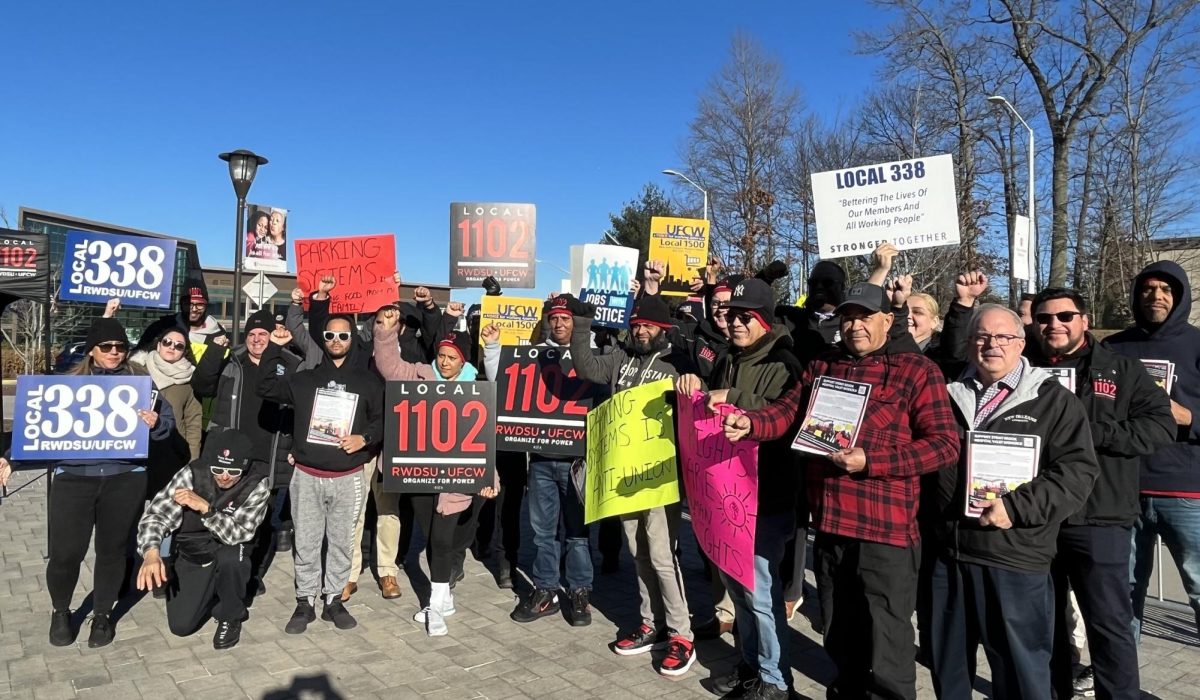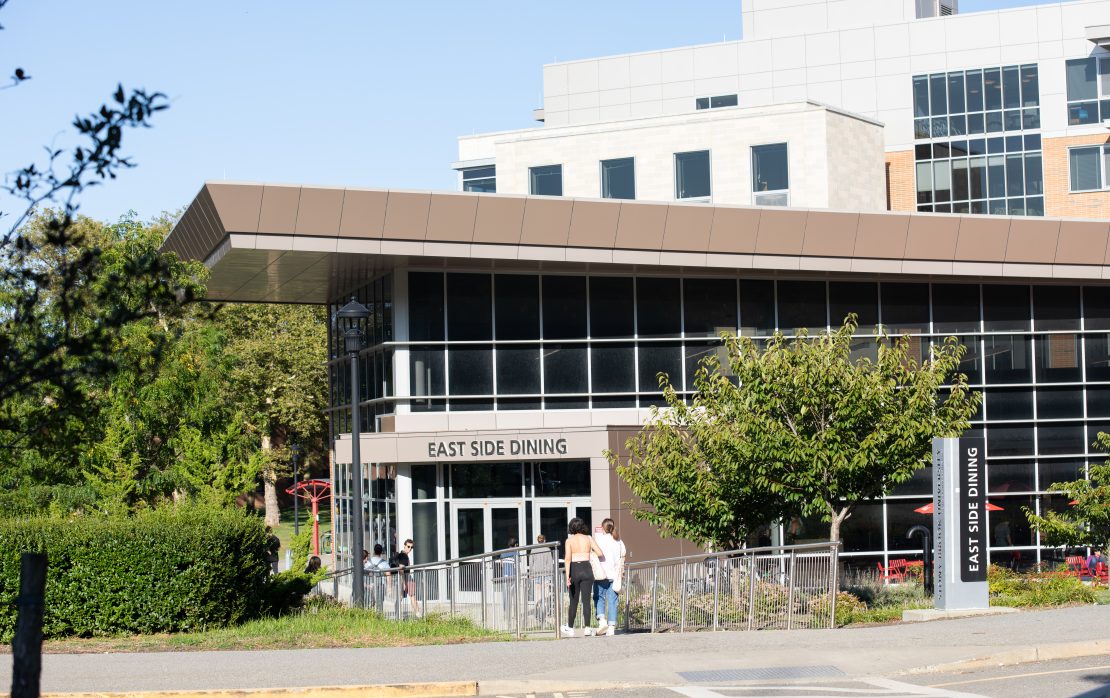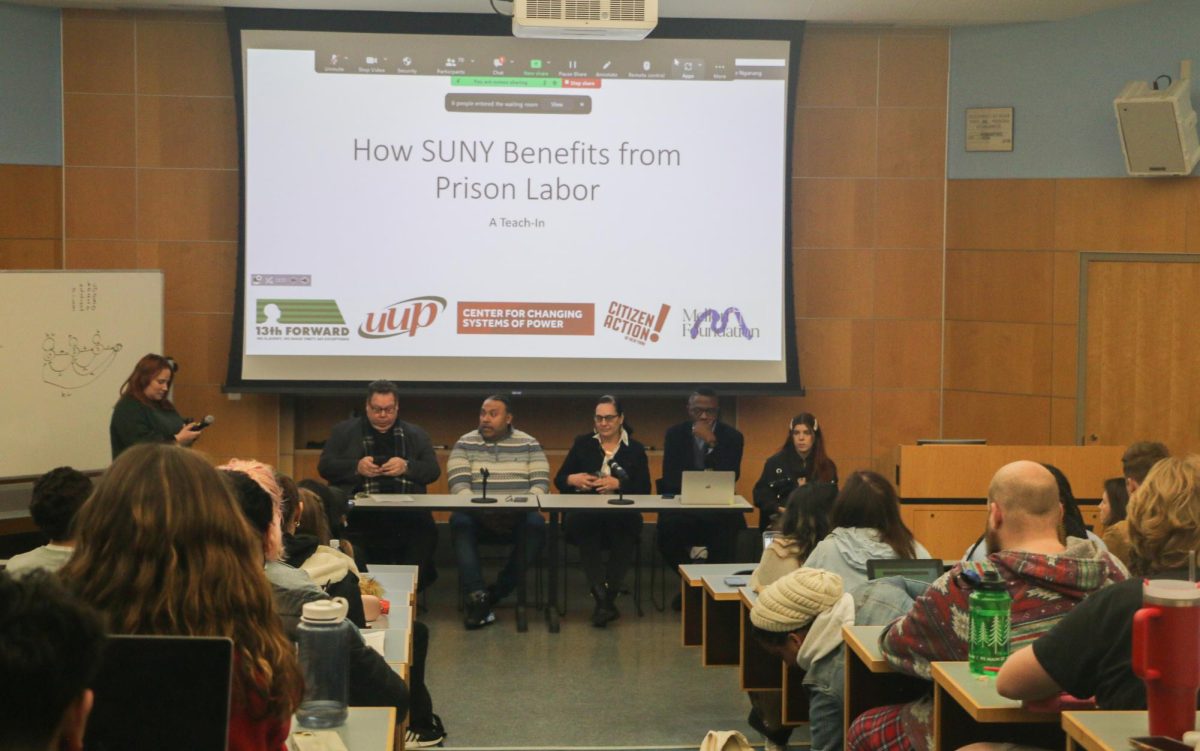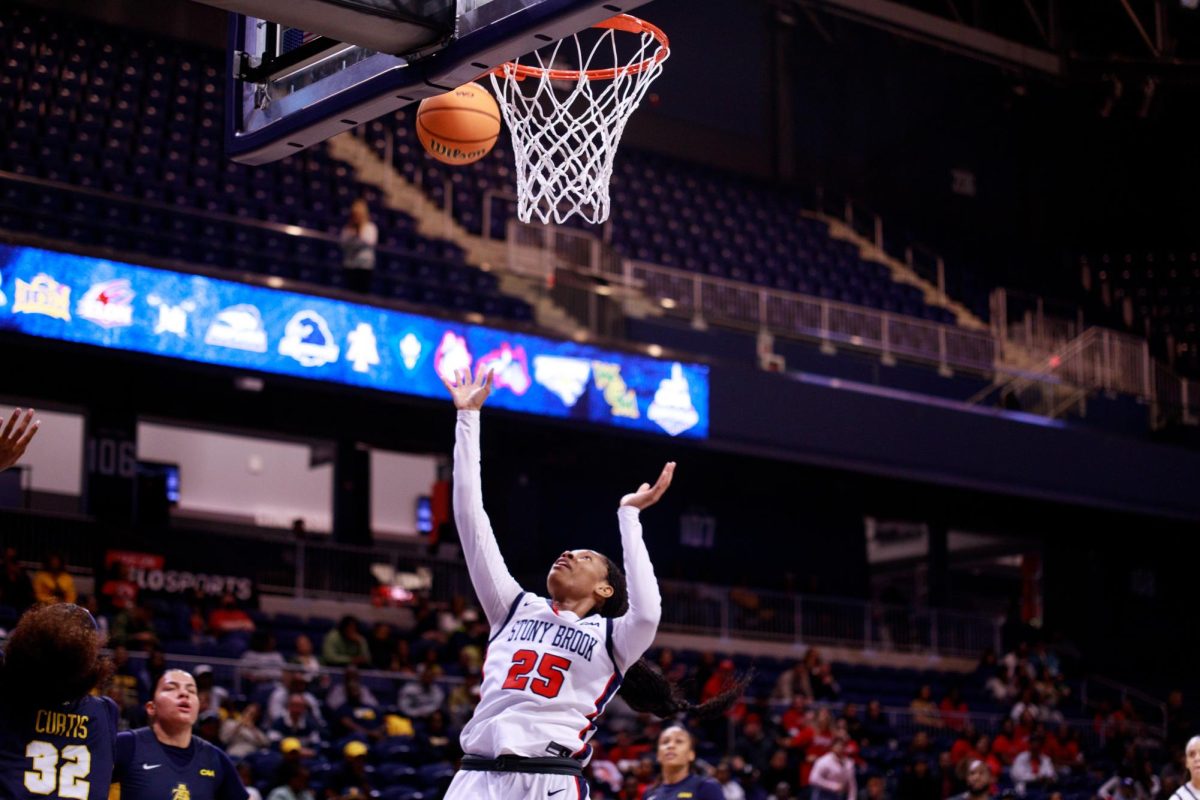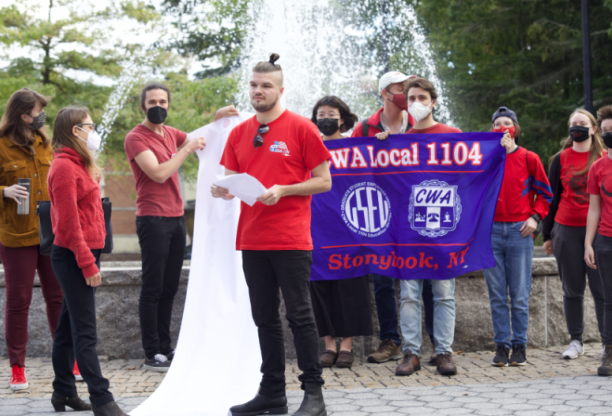
The Graduate Student Employees Union (GSEU) at Stony Brook gathered on campus Sept. 30 to deliver a 10-foot scroll with nearly 600 signatures to President Maurie McInnis’ office, demanding the university provide graduate workers with a living wage above the poverty line.
A group of 12 graduate students dressed in red gathered by the fountain outside of the Administration Building. Chapter President John Klecker unravelled the scroll and read the petition aloud, calling for the University to bargain with GSEU and agree on a living wage for graduate workers who “perform sixty percent of the instructional labor force.”
“They are lecturing in your classes, they are teaching recitations, they are holding office hours, they are grading your course work, they are proctoring your exams,” Klecker read from the petition. “This university runs because of its graduate student labor force. SUNY runs because we do.”
The group then marched to McInnis’ office where they were met by Lorraine Rubino, executive assistant to the president, who said McInnis was on a Zoom call but she would pass the petition along.
The GSEU has given McInnis 10 days to formally respond or they “will be forced to induce a response by other means.”
The GSEU is a labor union formed in the 1970s that represents all teaching and graduate assistants enrolled in the State University of New York (SUNY) system. Currently, there are about 5,000 members statewide. Their mission, according to their website, is to improve the living and working conditions for graduate workers by maintaining and extending their “wages, benefits and rights.”
According to a 2021 federal study by the United States Department of Housing and Urban Development, an “extremely low income” for one person in Suffolk County is $27,300 a year. The minimum stipend for graduate workers at Stony Brook is $20,000 a year. This means that graduate workers could be paid about $7,000 below what the federal government considers an extremely low income.
“That is not enough money to support yourself year-round on Long Island,” Klecker said. “This means that graduate assistants have to take on second and third jobs to support themselves, which takes away from their ability to teach and do research effectively and causes a lot of unwanted financial stress and worry in their lives.”
Klecker, a Ph.D. candidate in the chemistry department, works as a teaching assistant (TA) for advanced organic chemistry along with doing research in the chemical biology lab of Dr. Peter Tonge. Klecker joined the union in his first year as a graduate student after he was asked by his TA advisor to come in and teach a general chemistry lab on a snow day when the university was supposed to be closed.
“Usually when I have issues with my working conditions, the union is where I go,” Klecker said. “So I went to the labor union about this issue and I got it resolved; after that, I started organizing with the GSEU.”
Four years later, Klecker is now chapter president of the union with about 1,000 members at SBU. But graduate students are not the only people who support their cause. The petition has reached all parts of the u niversity, gaining signatures from undergraduates, staff and faculty.
Kellianne Ticcony, an undergraduate junior double-majoring in marine science and sustainability studies, also signed the petition.
“As someone who will eventually go to graduate school, I’m very passionate about this issue,” she said. “[Graduate workers] shouldn’t have to spend all their free time working other jobs just to make a living wage. That’s just not right.”
There are also several organizations that have endorsed the GSEU petition including the Graduate Student Government and the Young Democratic Socialists of America (YDSA).
“We support GSEU in their efforts to get paid a living wage,” YDSA said in an email to The Statesman. “We have heard the testimonials from graduate students and they are horrifying. No one should be worried about whether or not they can eat that day.”
Out of 63 colleges in the Association of American Universities, an organization composed of America’s leading research universities, Stony Brook currently ranks 57th in terms of graduate workers net stipend to cost of living ratio. Last year Stony Brook ranked last. The slight improvement was due to an action by the GSEU that eliminated student fees, equating to a roughly $2,500-a-year pay raise for the average student worker in the unit. While Klucker acknowledged the growth, he said it is still not enough.
“This is one of the most expensive places in the country to live, and if we want to be the premier flagship research university of the SUNY system, we need to pay our employees like it,” he said.
According to a survey conducted by the GSEU last spring, which received over 350 responses, 98% of graduate workers do not think their stipend is enough to live comfortably and focus on their research without financial worry or stress. The study also found that 68% said their research has suffered because of financial problems and 73% said their mental health has been impacted as well.
Doğa Öner, chief steward of the SBU chapter of the GSEU and Ph.D. student in the philosophy department, joined the union about two years ago. He now works as a teaching assistant and while he loves working with students, he said the stipend is simply not enough to “sustain themselves and live dignified human lives.”
“Housing here is almost as expensive as New York City,” Öner said. “I know students who have a lot of car costs, repair costs, insurance costs and yeah, it’s a struggle we all share.”
Klecker has faced similar hardships.
“For me right now, I had an issue where the direct deposit takes a month to process so I’ve been hit with bank fees because I hadn’t gotten a direct deposit in my account in time,” Klecker said.
His current wage for doing research year-round and working as a TA is $30,000. According to the Economic Policy Institute’s family budget calculator, the living wage in Suffolk County for one adult is $50,940 per year. According to the GSEU survey, when asked what graduate students thought a living wage was, the weighted average was $47,157 a year.
Klecker agrees and thinks “somewhere north of 40k a year” is a living wage for graduate students on Long Island.
Klecker finished reading the petition aloud by addressing the president specifically.
“To President McInnis,” he said. “Take steps towards solving inequality in academia by paying some of its most exploited workers, graduate workers, a living wage that’s above the poverty line.”
As of Oct. 5, neither Maurie McInnis nor anyone from administration has directly responded to the GSEU’s living wage petition.
Stony Brook University did not comment to The Statesman in time for publication.











